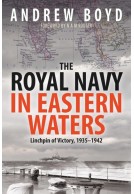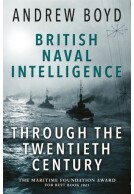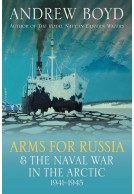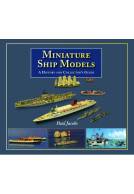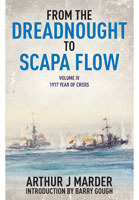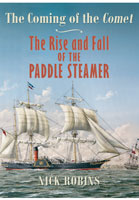British Naval Intelligence through the Twentieth Century (Hardback)

Pages: 800
Illustrations: 34 b/w photos & 4 maps
ISBN: 9781526736598
Published: 14th September 2020
Star review
Named as the Naval Review's 'Book of the Quarter'.
'British Naval Intelligence is an unprecendented and important addition to our knowledge.' (Reviewed by Professor Gwythian Prins)
'WINNER of the Mountbatten Maritime Literary Award, 2021'
"Highly Commended" by the Society for Nautical Research in their award for the 2021 Anderson Medal .
(click here for international delivery rates)
Need a currency converter? Check XE.com for live rates
| Other formats available | Price |
|---|---|
| British Naval Intelligence through… Paperback Add to Basket | £13.59 |
This major work is the first comprehensive account of how intelligence influenced and sustained British naval power from the late nineteenth century, when the Admiralty first created a dedicated intelligence department, through to the end of the Cold War.
It brings a critical new dimension to understanding British naval history in this period – setting naval intelligence in a wide context and emphasising the many parts of the British state that contributed to naval requirements. It is also a fascinating study of how naval needs and personalities shaped the British intelligence community that exists today as well as the concepts and values that underpin it.
Andrew Boyd explains why and how intelligence was collected and assesses its real impact on both wartime operations and peacetime policy. He confirms that naval intelligence made a vital contribution to Britain’s survival and ultimate victory in the two World Wars, but he
reappraises its role, highlighting the importance of communications intelligence to an effective blockade in the First, and according Enigma-generated Ultra less dominance compared to other sources in the Second. He reveals that coverage of Germany before 1914 and of the
three Axis powers in the interwar period was more effective than previously suggested. And though Britain’s power declined rapidly after 1945, he shows how intelligence helped the Royal Navy to remain a significant global force for the rest of the twentieth century, and in submarine warfare during the second half of the Cold War, to achieve influence and impact for Britain far exceeding the resources expended.
This compelling new history will have wide appeal to all readers interested in intelligence and its impact on naval policy and operations. It will transform their understanding of how Britain ensured its national security across the twentieth century.
This book should be required reading for all contemporary students of history. Although the future is yet to be written, Boyd has provided a very important contribution to the historiography of British intelligence, maritime strategy, and naval operations.
David Koehnen, US Naval War College Review - Winter 2022
Featured in
South West Soundings - The Newsletter of the South West Maritime History Society - December 2021, No 118
With its authoritative tone, wealth of detail, wide scope, and engaging coverage of personalities and bureaucratic interactions, British Naval Intelligence through the Twentieth Century is a monumental achievement. This outstanding book will surely become a benchmark study of the role of naval intelligence.
Northern Mariner/Le marin du nord - Issue No. 3 of Vol. 31, Summer 2021
'An original and masterful history of British naval intelligence. Remarkably valuable, and in many ways definitive, addition to the serious study of naval history.'
Captain Stephen Maffeo - International Journal of Naval History
This book comes off the press with a fanfare of praise from leading historians. Its publication is quite simply a major event. it will singlehandedly stimulate our greater interest and deeper understanding of naval events of the last century. It will inform the serious study of the academic, yet reward and delight a wider readership.
David Bowen, The Mariner's Mirror - February 2022
In summary, this is a truly excellent book that works on at least two levels. Whilst, as a product of deep scholarship and archival research, it will serve as a reference work it is also a very good read. Andrew Lambert is absolutely correct when, in the book’s foreword, he writes that ‘If there is a British way of acquiring and assessing intelligence, one that is strikingly outward-facing, with a distinctly naval character, then Andrew Boyd has written its history’. The scholarship that went into the production of this volume is matched by the author’s literary abilities. Boyd is superb at unravelling complex issues and explaining them in straightforward language, and this gift is utilised throughout the book. His style makes British Naval Intelligence Through the Twentieth Century a real pleasure to read. I have no hesitation in recommending this book to all who have an interest in the Royal Navy over the course of the twentieth century, and also predict that it will become essential reading within that group.
Intelligence and National Security Journal
Andrew Boyd 'has brought his characteristic thoroughness to this latest book', a 'substantial work', which 'combines flair for research and writing'....and 'places the activities of naval intelligence closer to the heart of the development of British intelligence than many might previously have considered'.
Huw Dylan, August issue of History Today magazine
In conclusion, this is a very well-researched book which discusses 100 years of British naval intelligence in an accessible and readable manner and, in so doing, provides valuable new insights into our understanding of the strengths and weaknesses of British naval power during the period under review. This is an important book and should be read by all those interested in the history of the Royal Navy in the twentieth century. Very highly recommended.
World Ship Society - Warships, February 2021
An extremely well researched and comprehensive read, but, it is a weighty tome indeed. This account covers just about everything to do with Naval Intelligence you could think of, personnel, incidents, codes, ciphers and general intelligence gathering.
Army Rumour Service (ARRSE)
Read the full review here
A good read albeit a long one. I recommend this book.
The Ton Class Association
'A remarkable book which for the first time puts intelligence in its place and tells us what happened and why.'
'Rear Admiral James Goldrick, distinguished naval historian interviewed by Jeune École'.
'For any modern naval officer, gives a systematic picture of naval warfare in a way not done by anybody else.'
'There is almost no episode of recent Royal Navy history on which Boyd does not cast the light of intelligence. Certainly future historians will not be able to write British naval history without looking up what Boyd has revealed.'
Warships International Fleet Review, February 2021
'Boyd writes sublimely...' and his 'great ability is to set events of a momentous century into their context...'
'This book will become a classic work of reference. It is a superb sophisticated and comprehensive re-examination of the role and uses of intelligence and a must-read for future writers of naval history.'
Book of the Quarter
The Naval Review, February 2021
This issue’s Book of the Quarter is a ground-breaking study and an important contribution to naval and intelligence history. In this book, the author provides a comprehensive account of the development of British naval intelligence and its contribution to naval and wider national power. Moreover, the author, himself a former submariner, provides a role model for today’s officers.
The Book of the Quarter series aims to highlight one book, be it a history, memoir, biography or strategy and pique members’ interest. By buying just one book of naval relevance every three months (and selection criteria does include price), members can quickly build up a private bookshelf of quality.
"Astonishingly Good Book".
Amazon UK Review
This really is a fantastic book on British naval intelligence which given the author's background should come as no surprise. His understanding of intelligence and how it works ensures that this will be THE book on the subject for many years to come.
5 Stars
"THE BEST BOOK IN ITS FIELD".
Amazon UK Review
Outstanding account and analysis of the intelligence background to British naval operations in the 20th century.
If you think you know about this subject and especially the two World Wars, think again - and enjoy and admire the original research and fresh insights that populate this authoritative, comprehensive history.
5 Stars
"A detailed and scholarly book with important revelations".
Amazon UK Review
This book is a great read. It is lengthy but stringently researched and gives insight into the vital role Intelligence played in many conflicts.
5 Stars
"A magisterial achievement".
Amazon UK Review
A definitive account by an author who brings naval experience to a welcome understanding of the British application of intelligence to strategic positions. Original excavation of official records is combined with a fine judgement of personalities and a developed, most accessible, narrative style. This great book is a must-read for anyone seeking the secret story of Britain's fortunes, through war and peace, in relation to foes and friends alike.
5 Stars
"The best book on this subject".
Amazon UK Review
A really excellent and thorough analysis. It actually goes far beyond straight intelligence, discussing also nuclear targeting, the UK development of its own Chevaline warheads and decoys, etc. More readable than other books discussing 20th century intelligence such as Hinsley which was overburdened by discussions of structures and committees.
One will learn a lot by reading this. My goodness, a lot of work must have gone into this masterpiece from someone with inside knowledge of how defence works from his time in the Navy.
5 Stars.
This is a rich and beautifully nuanced book, packed full of lessons for any RN officer who wishes truly to come to grips with the evolution of the Service: a history prerequisite to a contemporary understanding of the full reach of naval power. As Andrew Lambert rightly observes in his Foreword, it is in many ways definitive. It is worth every penny of its £35.
The Naval Review
Read the full review here
British Naval Intelligence is an unprecedented and important addition to our knowledge. The book kept this reviewer on the edge of his seat from start to finish, it cements Dr Boyd’s reputation as one of our leading naval and intelligence historians of this generation in lineal succession to the earlier generation of historians such as Marder and Roskill. Boyd offers us nothing less than a comprehensive rebalancing and a new way of looking not only at naval intelligence but at the entire modern history of British intelligence and hence of the deployment of British power.
Professor Gwythian Prins - Naval Review
British Naval Intelligence Through the Twentieth Century is a truly great work in every way and is necessary and fundamental reading for everyone with an interest in modern naval history.
Navy News
'To the serious student of modern naval history, this book must be consulted and referenced.'
Paul Beaver - Special Forces Club magazine
'To be frank, I couldn't put the book down as each page contained a historical gem.'
There is so much in this book that a mere summary does not give space for comment on more than a tiny fraction of its content. I can say without hesitation, however, that it is a masterly history of British naval intelligence that deserves to be placed in the essential category. This book brings a new dimension to the historiography of naval operations in the twentieth century and I recommend it unreservedly.
Australian Naval Institute
Having served in the Royal Navy during the period this book covers I found Andrew Boyd’s monumental new history a compelling read. Not far short of 800 pages, the text is supplemented by extensive notes and a useful bibliography.
Julian Stockwin
Boyd provides the first comprehensive account of how intelligence influenced and sustained British naval power from the late nineteenth century, when the Admiralty first created a dedicated intelligence department, through to the end of the Cold War. It brings a critical new dimension to understanding British naval history in this period setting naval intelligence in a wide context and emphasising the many parts of the British state that contributed to naval requirements. It is also a fascinating study of how naval needs and personalities shaped the British intelligence community that exists today as well as the concepts and values that underpin it.
Boyd’s work will appeal to historians of the twentieth century and also to those readers interested in intelligence and its impact on naval policy and operations.
Read the full review here
‘An excellent book that puts the history of British naval intelligence into proper perspective. Andrew Boyd gives us a new understanding of what British naval intelligence was and how it worked. More than that, this book will spur you to think about the ways in which the broader British intelligence community developed over time and how we have to write its history. A really valuable addition to the field.’
Dan Todman, Professor of Modern History, Queen Mary College University of London
‘In this monumental study Andrew Boyd more than confirms his position as one of the most important naval historians of the current era. His extraordinarily comprehensive and original account of intelligence and its key impact on strategy and operations must now be a common starting point for any serious work on modern British naval history.’
Eric Grove, former Professor of Naval History at Salford and Liverpool Hope Universities
‘This superb study gives the first truly comprehensive picture of British naval intelligence in the 20th century. Exhaustively researched, elegantly written and persuasively argued, it provides a nuanced portrait of intelligence gathering as a “cumulative process of knowledge and understanding”, and explains how that affected British naval policy, strategy and high-level operations. Dr Boyd is a historian of rare talent and his book will be required reading for anyone interested in naval history or Britain at war in the 20th century.’
Saul David, author of Crucible of Hell: Okinawa, The Last Great Battle of the Second World War
‘British naval intelligence has needed and deserved a book of this depth and calibre for a long time. Andrew Boyd combines a cool detachment, an insider’s feel and a talent for archival work with an eye for context, moment and significance.’
Professor Peter Hennessy, co-author of The Silent Deep: The Royal Navy Submarine Service Since 1945
'This book is at once a comprehensive and sophisticated re-examination of a fascinating subject, an opportunity to emphasise the place of intelligence in the wider work of navies, in peace and war, and to stress the critical role of naval power in British policy.’
Andrew Lambert, Laughton Professor of Naval History, Kings College London
About Andrew Boyd
ANDREW BOYD CMG, OBE, DPhil was educated at Britannia Royal Naval College and St Johns College, Oxford. He served as a submariner in the Royal Navy before joining the Foreign & Commonwealth Office in 1980. He has had a long standing interest in 20th-century naval history and was awarded a research fellowship to undertake a DPhil. This was the basis of his first book, The Royal Navy in Eastern Waters, which was followed by the critically-acclaimed British Naval Intelligence through the Twentieth Century. His most recent book, Arms for Russia and the Naval War in the Arctic 1941–1945, is a fascinating reassessment of Allied support for the Soviets.
About Andrew Lambert
Andrew Lambert, Laughton Professor of Naval History at King’s College, London, is, according to David Cannadine, Dodge Professor of History at Princeton, ‘The outstanding British naval historian of his generation’. He provided the political and strategic context to the detailed biographical research by Andrew Bond, a retired engineering journalist, while Frank Cowin, a prominent Manx antiquarian, dealt with Quilliam’s background and reputation on the Island.








